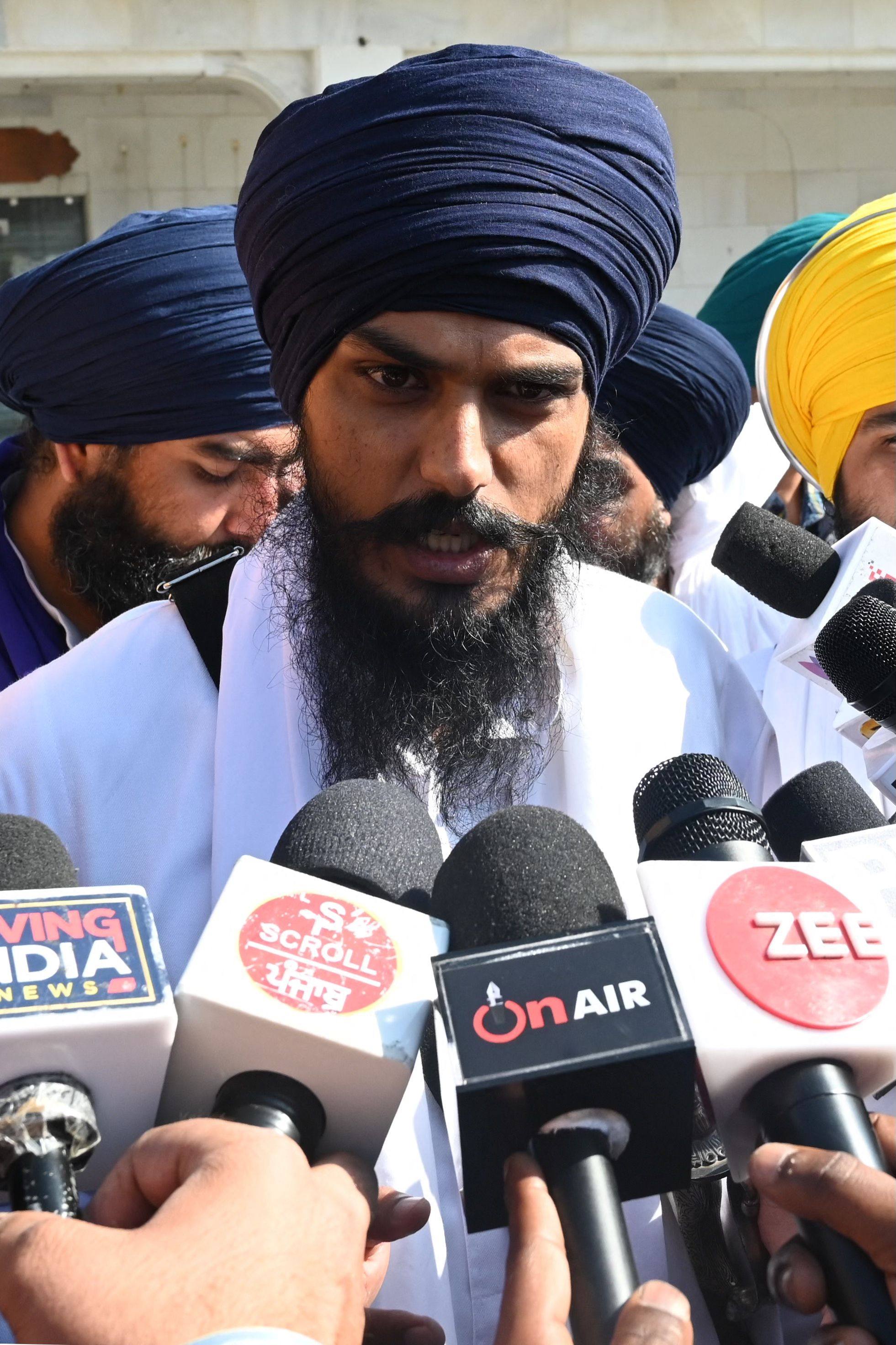
Anger mounts among Sikh diaspora as Indian police cut internet in search for fugitive separatist preacher Amritpal Singh
- Police said Amritpal Singh has been on the run since Saturday when officers tried to block his motorcade and arrest him
- Singh is trying to revive a separatist movement calling for an independent Sikh homeland in Punjab
A manhunt launched by police against a separatist leader in the Indian state of Sikh-majority Punjab that resulted in mass arrests, deployment of paramilitary forces and an internet blackout affecting millions of people has sparked anger among the Sikh diaspora.
The pursuit of Amritpal Singh, a self-styled Sikh preacher, was triggered after Indian police accused the 30-year-old and his supporters of creating discord. Police said Singh has been on the run since Saturday when officers tried to block his motorcade and arrest him.
Sukhchain Singh Gill, the inspector general of police for Punjab, said on Wednesday that police have so far arrested 154 of Singh’s supporters and seized 10 guns and several rounds of ammunition.

Singh made national headlines in February when his supporters attacked a police station in Punjab demanding the release of a jailed aide.
Thousands of people were killed during a bloody insurgency movement in Punjab state in the 1980s and early 1990s, when the call for Khalistan was at its peak.
As police intensified the search for Singh, Sikhs living overseas have been protesting against what they claim are the arbitrary arrests of more than 100 of his alleged followers, and the internet shutdown that led to the loss of communication with their family members in Punjab.
Overall, some 30 million people across the region have been cut off from mobile internet and text messaging services.
We have serious concerns over the unprecedented attempt by the Indian government and police in Punjab to trample upon the democratic rights of Sikhs
The diaspora has also expressed concerns over alleged human rights violations by police.
In the Australian capital, Canberra, more than 150 Sikhs on Monday, reportedly carried out a peaceful protest over the mass arrests and internet blackout.
A section of Sikhs in the UK on Sunday protested in front of the Indian High Commission in London, where one protester pulled down the Indian national flag.
Soon after, the Indian ministry of external affairs summoned a senior British diplomat in New Delhi seeking an explanation over the “complete absence of British security” at the mission.
India arrests 112 people in manhunt for radical Sikh separatist
On the same day, another protest in the US was carried out at the Indian consulate in San Francisco, where some Sikhs raised pro-Khalistan slogans, and installed two so-called Khalistani flags at the premises.
Former Indian diplomat Gopalaswami Parthasarathy said New Delhi is “unhappy” about the recent attacks, but added there is no organised network of Khalistanis in the US whereas in the UK “some political parties” play upon Khalistani sentiment for a “section of Sikh votes”.
In 2021, a Sikh group, The Sikhs for Justice (SFJ), organised a referendum for Khalistan in the UK but India took strong exception to the UK allowing the poll.
Parthasarathy added that India will not “tolerate” this for too long, and there will be an “impact” on India-UK relations because Indians want their government to respond to this attack “effectively.”
Condemning the “disgraceful” attack, Harsev Bains, vice-president of Punjabi-dominated Indian Workers’ Association (IWA), the oldest Indian migrants’ group in the UK, said exercising people’s democratic right to peaceful protest shouldn’t be an “excuse” for “extremists” to attack Indian institutions.

Bains clarified that only a minority group within the Sikh community protested at the mission, and Amritpal Singh has no popularity in the UK as claimed by some Indian media.
California-based Amrik Singh Khadali, member of non-profit, Gadar Memorial Steering Committee, said that Singh’s followers in San Francisco often try to spread their teachings in local Sikh temples – but most people show “no interest”.
Khalsa Aid Canada director Jindi Singh said that although the Sikh community in Canada has “diverse” opinions about him, many consider him a “religious preacher,” who waged a war against Punjab’s drug addiction.
Despite reports about his fight against drugs, Bains said Singh “doesn’t seem to have any deep knowledge of Sikhism”.
In 2012, Amritpal Singh, originally from Punjab, moved to Dubai to run his family’s transport business, but came back to India a decade later, and took charge of Waris Punjab De after its head Deep Sidhu died last year.
Singh has also claimed to draw inspiration from the former head of the Khalistan movement. Jarnail Singh Bhindranwale, along with his more than 490 followers were killed in 1984 when the Indian army stormed the Golden Temple, the holiest shrine in the Sikh religion.

Genuine fears
More than Singh, the Sikh diaspora is worried about the “innocent” Sikhs in Punjab, who could be wrongly targeted by police as happened in the 80s and the 90s, when thousands of young men were randomly charged by police over their alleged links with the Khalistani movement.
A 2019 documentary, Punjab Disappeared, stated 8,257 disappearances, extrajudicial killings and secret cremations took place across Punjab between 1984 and 1995.
“We fear that there will be another round of fake encounters and enforced disappearances,” Australia’s Amar Singh said. “In 2023, the Indian government must understand that these tactics won’t work.”
‘Less than 100 left behind’: Afghan Sikhs take refuge from Taliban
Attack on Sikh diaspora
As a section of Indians labelled many Sikhs in the UK as “Khalistanis” after the attack on the Indian flag, Bains said Sikhs believe the Indian flag represents Indian people, not the Indian ruling party or its supporters, who are propagating such “false narratives”.
Additional reporting by Reuters, Associated Press
